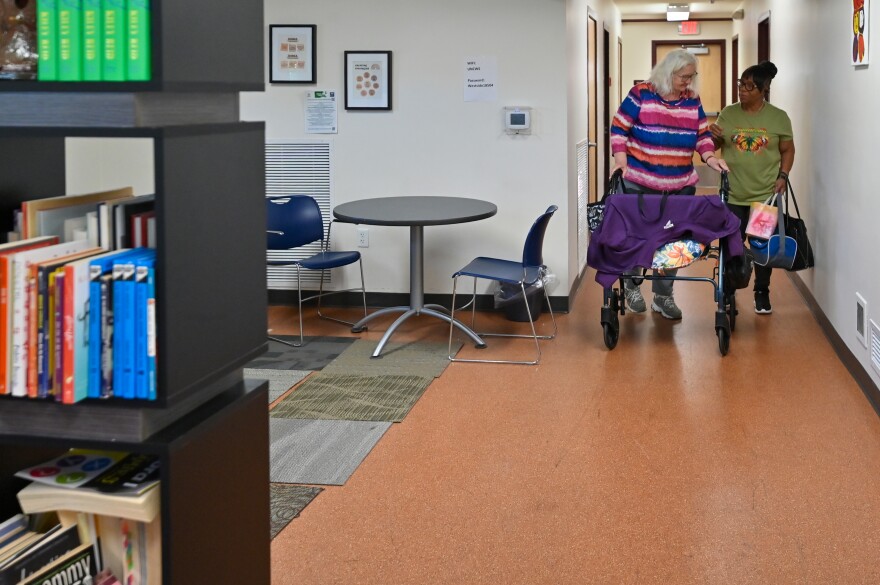Ruth Parry started as an Arts for Life participant in 2020. At the time, she was her 94-year-old mother's caregiver and used the classes as an escape.
Since her mother died, the 64-year-old has been diagnosed with dementia. Now, her sister is her caregiver.
Parry's life has changed, but Arts for Life, where she discovered her love for writing, remains a constant.
“I can write about it now. I just know that I'm able to share my really good days and my really bad days, and there have been plenty of bad days,” Parry said.
Arts for Life hosts free art and writing classes from professional artists for caregivers and their care recipients. The program encourages participants to use art as a way to strengthen relationships and accept their current phase of life.
‘Fun Fridays’ at Arts for Life
The classes are on Fridays from 10 a.m. to noon at United Neighborhood Centers’ Oppenheim Healthy Aging Campus in West Scranton.
“It's something that the participants really look forward to all week because it provides that much needed respite from the demands of the roles that they have as caretakers,” said Krissy Grunza, assistant director of community health and aging at United Neighborhood Centers. “It also provides them an outlet for stress reduction, emotional expression and enhanced self care.”
Jodi Miller attends the classes as often as she can. She attended for the first time about three years ago.
“I started off by myself being the caretaker for my husband and my mom,” Miller said. “My mom has dementia, and my husband's just got a lot of really serious health issues, and I eventually talked him into coming, and our lives changed dramatically. We call Fridays our ‘Fun Fridays’ because it's just time to just be ourselves and just let our hair down and forget about life's troubles.”
KEYSTONE EDITION 'Caregiving: Navigating the Challenges'
Watch the full Keystone Edition episode Monday, Oct. 6 at 7 p.m on WVIA-TV.
Her husband’s health means she can’t make every class.
“Today's the first time I've actually been back here, probably in about three months, because my husband's health. Eight times in the hospital so far this year, and so I was able to have somebody come and sit with him, so I could be here today. It's rejuvenating. Driving over here, it was just like the music was cranking,” Miller said.
Miller, and her husband, were skeptical at first.
“Before I started coming here, art did not exist in my vocabulary at all,” Miller said.
Even though her husband's health issues prevent him from attending classes anymore, they both regularly make art and display it in their home.
“I would have never called myself an artist, but now I've found this inner thing within me, and it's now as a caregiver, when I have to sit in [the] hospital for hours and days upon days I bring my book with me, and I write. It's my therapy. It's a great source of decompressing during really stressful times,” she said.
Art helps participants gain confidence, find community
Liz Faist organizes the class. She’s a mixed media artist and sometimes teaches on Fridays. Faist sees many participants like Miller attend with low expectations.
“They come into the class, sometimes saying, ‘Oh, I don't write, or I'm not an artist.’ Before you know it, they learn different technical skills, historical and cultural context about artists, and then they're creating their own work,” Faist said. “They take ownership of it, and all of a sudden they're writing or creating a visual piece. It doesn't just end with the classroom. They're leaving here and continuing to work on their work throughout the week. They connect with one another and are inspired by one another in the program.”

Dr. Catherine Richmond-Cullen started the program through her role as director of the Pennsylvania Creative Industries Partnership. She secured funding about a decade ago through the state's Department of Aging and local foundations. One of the most rewarding parts of her job is watching people’s transformations.
“People are trepidatious in the beginning, but they can't help it. The arts move us to another place,” Richmond-Cullen said.
Participants also receive two free tickets to every Broadway in Scranton show each season.
“It's embellishing one's life. It's adding enrichment, opportunities to come as friends. They come and they sit together and they enjoy the show, and then they come back and they talk about the show,” Richmond-Cullen said.
Carol Rodriguez and Gladys Kennedy attend the class weekly. Kennedy is Rodriguez’s caregiver. The pair uses the class to bond. Rodriguez, who is 74, also never considered herself an artist.
“You let your creativity flow and surprise you like, ‘Oh, my God, did I do that?’ And you start to feel good, like, ‘Yes, I did that,’” Rodriguez said.
Kennedy said she’d come to the class every day if it was offered.
“I asked other people, ‘Do y'all want to come to the art class on Friday?’ Because it's so peaceful, and I think their mind would be better, instead of just sitting around, but just come here and you'll be thankful,” Kennedy said.
Art can improve the caregiver/care recipient relationship
Research archived at the National Institutes of Health finds that a positive relationship between a caregiver and their care recipient is important for both parties. A relationship built on trust decreases the likelihood of depression in both and can lead to a higher quality of care.
Richmond-Cullen conducted research now archived at the National Institutes of Health that shows how art can, “mediate problems of loneliness, isolation and caregiver stress.”
“We can look at the arts as a way to improve people's lives, their health and well being, and to improve the quality of life of those of us who are older and aging,” Richmond-Cullen said.
Faist sees relationships improve as people attend the classes.
“It allows for a natural connection to happen between the caregiver and the care recipient,” Faist said. “With some participants, it's really connected, and they're really working together, and others really take that time for themselves, to have that respite, or to have that moment of individuality, where they can explore their own creative side.”

Encouraging caregivers to take care of themselves, too
The class offers relaxation for caregivers.
“What we thought was going to be the respite is a respite, but in a different way,” Richmond- Cullen said. “Participating in the program with their loved ones, but also improving their own lives and their own creative souls through art making.”
Miller said meeting other caregivers at the class helps her take care of herself.
“We as caretakers, I feel like we have a responsibility to share with other people or in our same shoes, that it's okay to take time for ourselves, and we don't have to feel guilty about it, and we can still have enjoyment in really hard end of life situations,” Miller said.
Learning new skills in the class can increase self-confidence, which can translate to the participants’ roles as caregivers.
“The caregiver also feels more self confidence and maybe empathy for others, and I'm not going to say it ameliorates all the problems of one who has to take care of someone full time. It doesn't, but any little positive addition in our lives is something,” Richmond-Cullen said.
The class also allows Miller to adapt her relationship with her mother. She brings art supplies to visit her mother where she lives at a skilled nursing facility.
“I'm 61 years old, and I never really sat and colored with my mom. This is my time to make memories with my mom, meeting her where she's at, not having any expectations from her. This art has given me many memories, not just in my mind, but I have memories of her artwork and hanging it on the wall or getting it framed and giving it as a gift to a sibling. Instead of it being we are losing mom, we've gained a new piece of mom,” she said.
New, more positive perspectives from Arts for Life
Faist encourages anyone in the caregiver or care recipient stage of life to attend the class — even if they are doubtful of their artistic abilities.
“If you're human, you're a creative, you're an artist,” Faist said.
Miller admits her life as a caregiver is not easy. But Arts for Life allowed her to appreciate this new phase of her and her husband’s 45-year relationship.
“I never saw this side of him. He's got some amazing artwork that comes out of him. It's a new love and appreciation and respect that he had the courage at his age and his sickness to want to get up, get dressed on Fridays, and to come and to be part of it and to open himself up. We don't like change, and the older you are, the harder it is to change. But he put on his big boy pants, I put on my big girl pants, and we came here, and our lives have been so enriched because of it,” Miller said.
Parry initially felt like a burden to her sister when they entered the caregiver/ care recipient relationship. Arts for Life gave her a newfound love of writing– and allowed her to adapt.
“It's classes like this that keep the age going in a positive direction, even though I have some very serious health problems, I don't focus on that,” Parry said.














